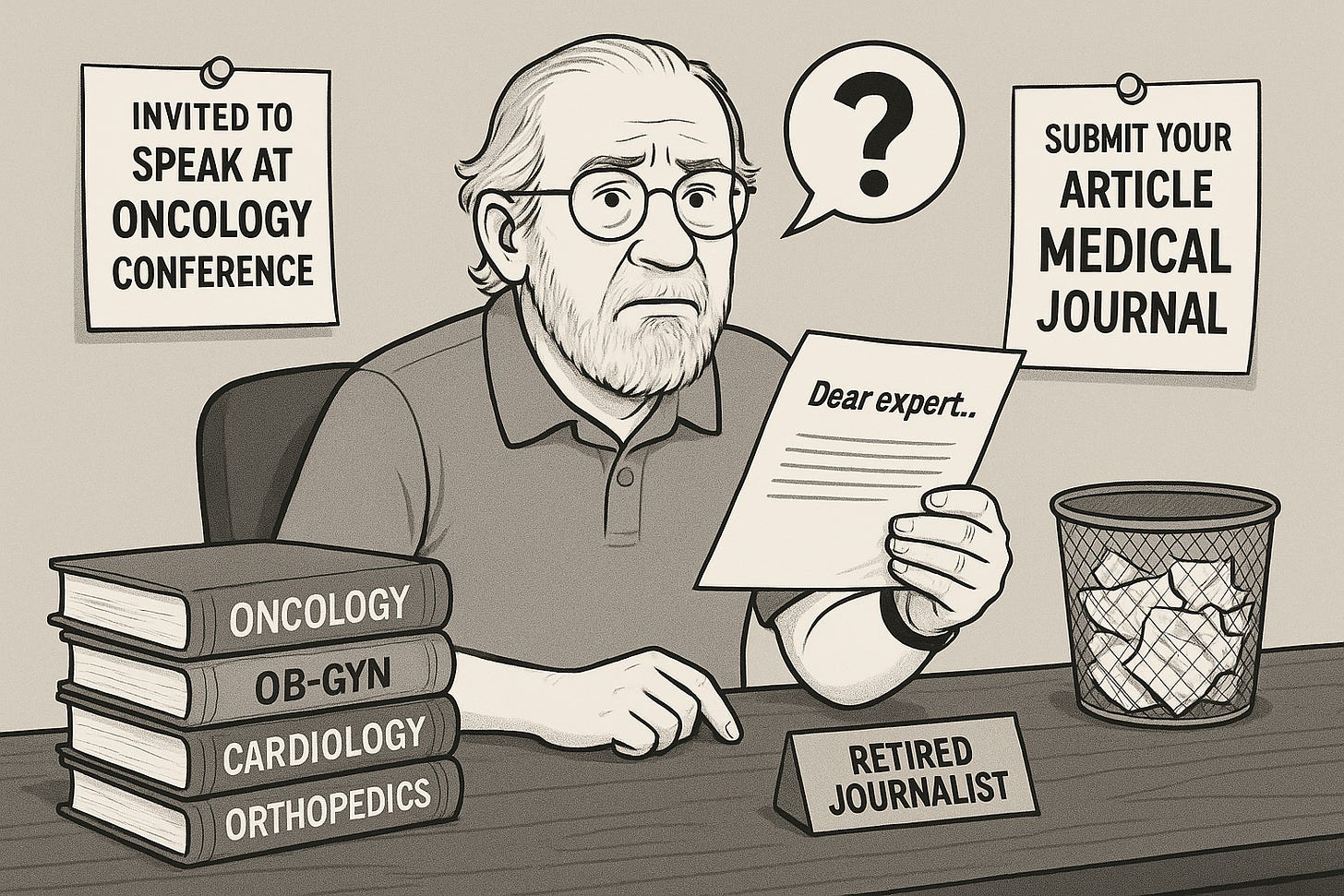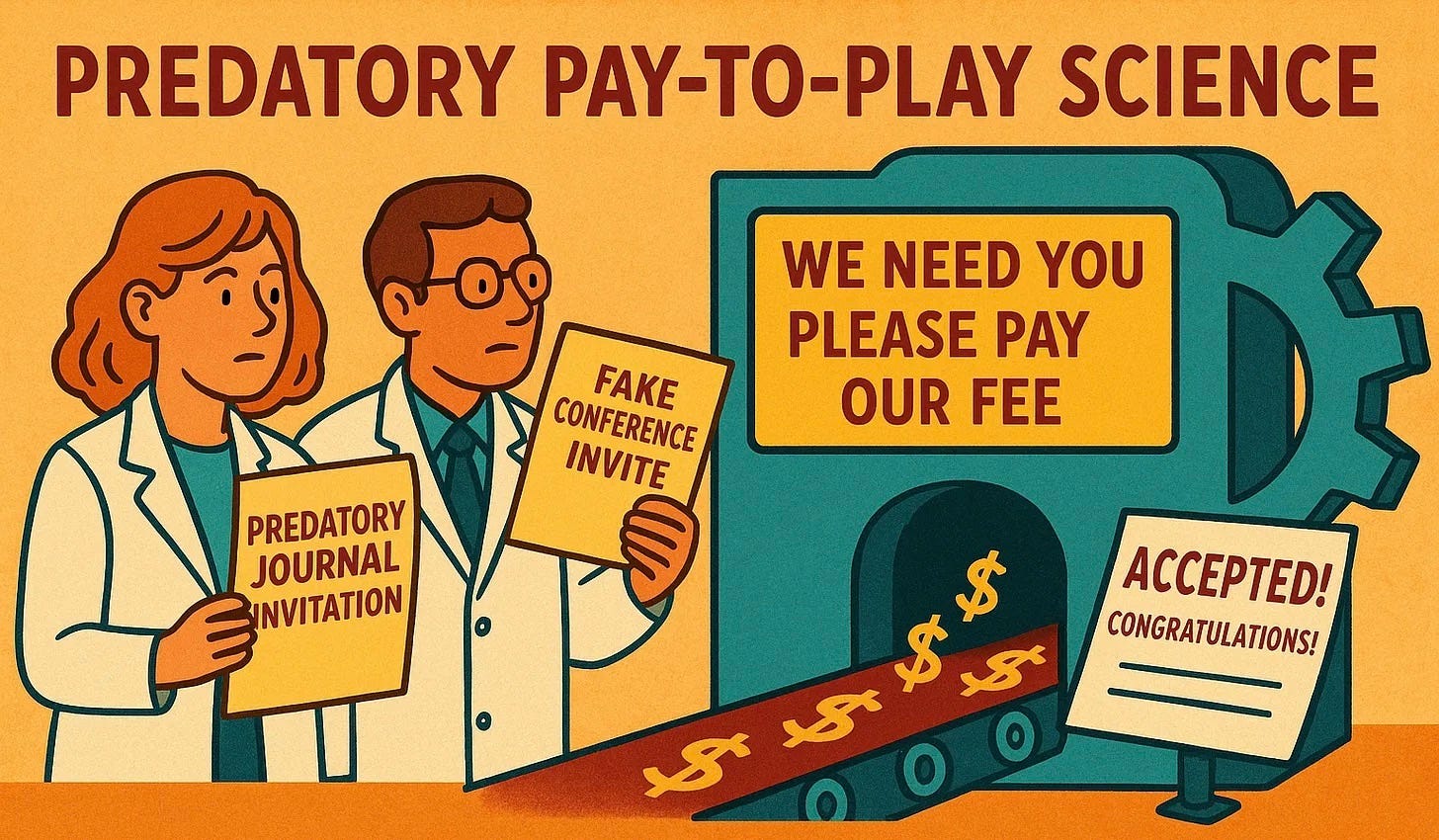We’re at the half-way point of 2025 and I’ve already received more than 60 invitations to speak at medical conferences - some in tempting locations like Rome or Singapore - or to submit my article to an esteemed specialty medical journal. They’ve all ended up in my junk folder. To be clear, I am just a retired health care journalist. I do not have a PhD, an MD, an RN, or any other advanced degree in health/medicine/science.
Why am I writing about this? Because I try to address any communications method that might pollute the public dialogue about health care. And these invitations represent a murky morass.
I’ll share just a few of the invitations - a dirty dozen tempting offers.
We are thrilled to invite you as a Speaker for the Heart Congress 2025 in Rome, Italy. Your exceptional expertise in the field of Cardiology aligns perfectly with our conference focus. (My heart soared, but alas, I declined.)
I am reaching out to invite you to contribute a commentary article to Journal of AIDS and HIV Treatment on a topic that aligns with your expertise and interests. We greatly admire your work, and we believe that your unique insights and perspectives would make a valuable addition to our publication.
It is an honor and privilege to invite you to participate as a Speaker to our event 3rd International Conference on Vaccines Research and Development which is going to be held at Amsterdam. (Not in tulip season, so, no.)
We are thrilled to offer you an exclusive opportunity to join the 2nd International Congress on Psychology & Behavioral Sciences as a VIP speaker - your chance to share your expertise with a global audience.
Given your expertise in Pharmacology, we believe that your contributions would significantly enrich our publication, Annals of Pharmacology and Pharmaceutical Sciences. (What drugs are the editors taking?)
I extend an invitation to join us as a distinguished speaker at the Nursing Global Conference in Geneva, Switzerland. (I’m Swiss, am married to a nurse, but I’m not one.)
We are excited to invite you to speak as a Distinguished speaker at the World Nursing Science Conference 2025, in Boston. Your extensive experience and groundbreaking work in Nursing make you an ideal leader to share your knowledge and insights with our diverse, global audience. (I’m still not a nurse)
I am delighted to invite you to speak at the International Conference on Orthodontics & Dental Medicine in Philadelphia. Your dental expertise would greatly enrich our conference. (Sorry, I dislike dentists and crowds.)
Looking at your renowned and excellent scientific profile in the field of "The Journal of Orthopaedics,” we are pleased to invite you to join our network of professional researchers as an editorial board member. (I’d need to bone up.)
I received an invitation from the Journal of Cellular Immunology. It read “We are excited to extend an invitation to you to contribute a commentary on article entitled "What are the roles and responsibilities of the media in disseminating health information?" I did co-author a paper with that title 20 years ago, but it had zero to do with cellular immunology.
We are thrilled to extend an exclusive invitation for you to take center stage at the Dermatology and Plastic Surgery World Conference in Paris. As a thought leader in your field, your insights can inspire change, spark innovation, and redefine the future of dermatology and plastic surgery. (I’d love to inspire change in that field, but I may be having a facelift that week.)
Having reviewed your previous publication titled “Statement of Principles for Health Care Journalists" I am impressed with the quality and relevance of your research in the field of Food science. We are excited to invite you to submit your latest research work to Integrative Food, Nutrition and Metabolism Journal. (Huh?!?)
Predatory journals
This is not a new issue. For years, Jeffrey Beall, Scholarly Communications Librarian at the University of Colorado, published a list of questionable open-access publishers. I can only wonder how many academics facing the pressure-to-publish in order to get tenure cite publications in these journals, something Beall warned universities about.
John Bohannon published “Who’s Afraid of Peer Review” in Science in 2013. It described the ruse he executed, submitting to open-access journals a fake, clearly-flawed article about “the anticancer properties of a chemical extracted from a lichen.” Excerpt:
Over the past 10 months, I have submitted 304 versions of the wonder drug paper to open-access journals. More than half of the journals accepted the paper, failing to notice its fatal flaws. Beyond that headline result, the data from this sting operation reveal the contours of an emerging Wild West in academic publishing.
In 2019, 43 concerned parties from 10 countries met in Ottawa to try to develop solutions for the predatory journal problem.
The Retraction Watch website has published many articles about predatory journals.
A 2021 journal article was written by a clinician-scientist who analyzed invitations in his own email inbox. He wrote about predatory or fake journals:
They number in thousands in the biomedical sphere alone. There has been a staggering increase in the number of such journals over the last decade, and multiple reasons are attributed for this surge, economic ones being the foremost. These journals typically claim to be multidisciplinary with quick publication times for a particular charge. They disguise as open access to profit from the article processing charges. Contrary to their claims, there is no peer review, and most of the editorial board is fake. The predatory journals frequently contact researchers by email to solicit articles, and cramming of the inbox with such mails is not unusual. As time passes, these journals are getting more deceptive, and it gets difficult for the prospective author to distinguish real from fake. The early and mid-career researchers are especially prone to the trap. Similar is the story of the predatory conferences.
Predatory conference invitations
I fell for a fake conference invitation about 15 years ago. I was young(er) and dumb(er) then. I even booked a flight to Europe before I realized that I’d been bamboozled. The George Washington University health sciences library posts tips on how to spot a predatory conference. Excerpt:
With the rise of predatory behavior in the publishing industry, many predatory publishers have expanded their business models to make additional profits from fake conferences.
At a glance, these predatory conferences can seem to be legitimate and scientific-based events. Be aware that these conferences are organized by revenue-generating companies who not only exploit presenters and attendees but also increase profits by collecting registration fees. In addition, these fake conferences do not provide adequate scholarly presentation sessions. Many academics arrive at these conferences only to discover that there are very few attendees, a limited number of actual presentations, or that multiple conferences covering a wide range of topics are combined into a single conference.
Why me?
So how did I get on the mailing list for the fake journals and events? Maybe because I worked in health care journalism for 50 years and published some peer-reviewed journal articles. These predatory projects could scour PubMed or other online resources and grab the name of any author remotely connected to science or medicine. If I accept the invitation, my experience may lend an air of legitimacy to their journal or conference (which shows how desperate they are!). And I would have to pay for this privilege.
Who’s behind it?
There are for-profit publishing and event-coordinating businesses with global operations. Some operate out of countries with lax enforcement. They make money by charging fees (may range from $500-$3,000) for processing fake medical journal submissions or registration fees for shoddy conferences.
Why does this matter?
It further erodes trust in scientific publishing and in science itself. When junk science invades the literature, it dilutes and pollutes the entire field. If any of this reaches the general public, confusion and deception and mistrust may follow.
It seems to matter even more now, when biomedical research and publication in the US has been buffeted by government-imposed constraints and cutbacks. And when Health & Human Services director Robert F. Kennedy, Jr., said recently about 3 named major journals and x number of others:
“Unless those journals change dramatically, we are going to stop NIH scientists from publishing in them and we’re going to create our own journals in-house.”
Yeah, that editorial process sounds just about as high-quality as the predatory journals cited above. Who knows? Maybe I’ll be invited to participate. My resume includes glowing testimonials from journals all over the world, as you’ve seen. I’d be happy to write about topics favored by this Administration: ivermectin, injecting bleach or shining ultraviolet light inside the body to treat COVID, wind turbines causing mental illness, toxic chemtrails, Lyme disease as a bioweapon, raw milk healthier than pasteurized, poisonous seed oils, the US food supply is poison, miraculous green coffee diet pills, gut tests to diagnose mental illness, and a whole lot more.








Not in tulip season, so, no.😂
Hey wanted to let you know about my substack: a comic on US healthcare policy.
Www.offlabelideas.com